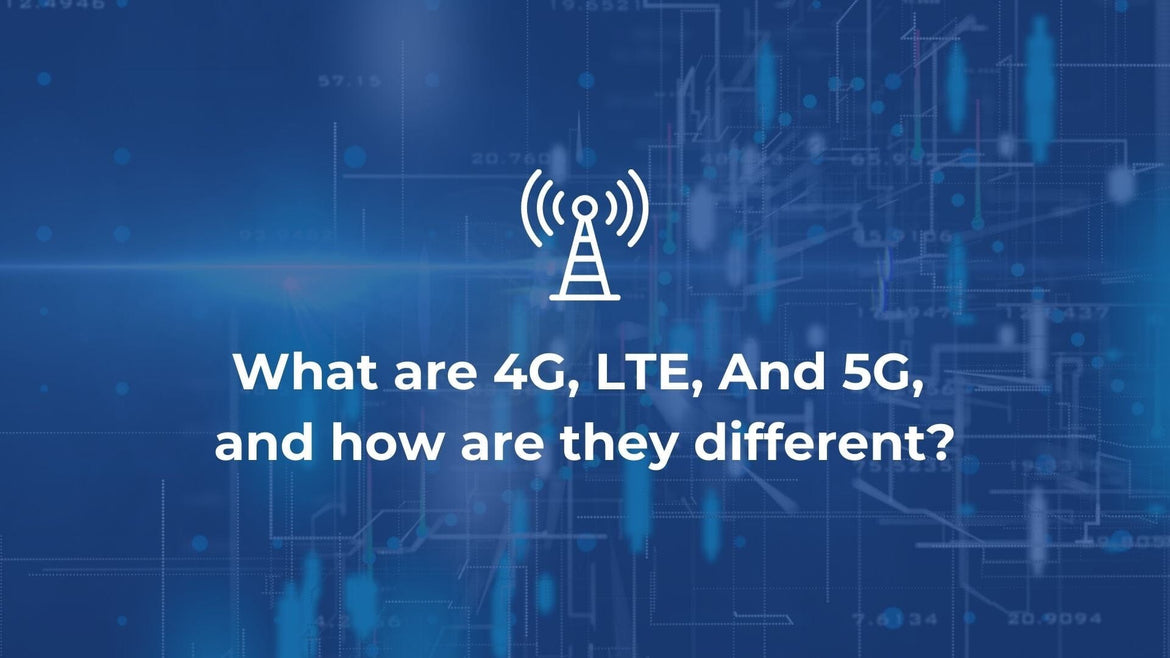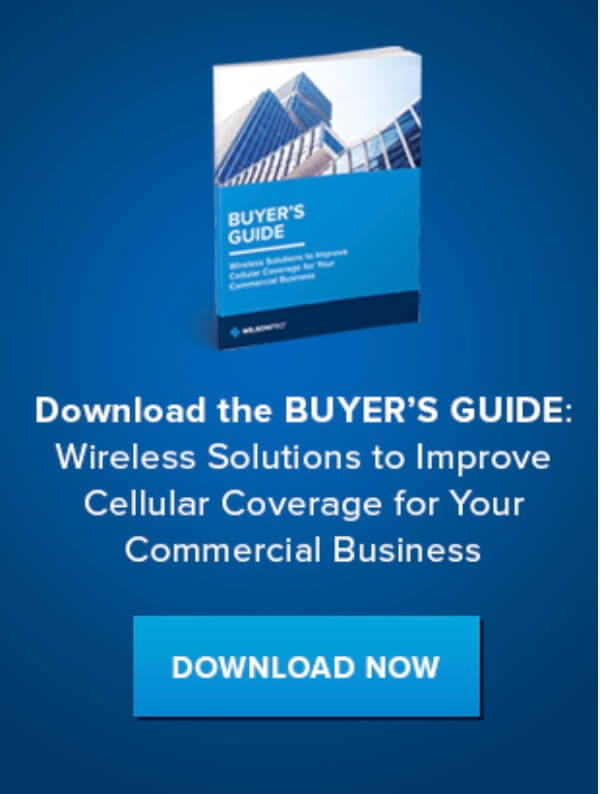
What are 4G, LTE, And 5G, and how do they differ?
- News
- 12 Oct, 2022
Network providers often use terms like 4G, 4G LTE, 4G LTE-A, 5Ge, 5G, 5G NR, 5G+. But what do these terms actually mean? In this blog we take a closer look at the different generations of cellular communication.

What is 4G?
The Fourth Generation, more commonly known as 4G, is a specification laid down by the International Telecommunications Union (ITU) in 2008. Specifically, this was set out by the ITU-R, which works with radio communications. 4G is known primarily for its broadband capabilities and significantly higher speeds than the previous third generation, which introduced data connectivity into the cellular space.
Since there was such a large gap between the 3G standard and 4G, companies wanted to ensure their customers knew they were receiving superior service than just the same old 3G networks, so they came up with a solution. That solution was "Long-Term Evolution” better known as LTE. The intial idea was that it represented a "Long-Term Evolution" toward the 4G standard. What clever marketers figured out was that they could present it as something better than that standard if they simply added "4G" before it. Hence, "4G LTE."
How Fast is 4G?
The ITU standard specified a minimum specification of 100 Mbps download speed and a maximum of 1Gbps, which, at the time, was not possible. It was only many years later that South African networks realised these aims.
To qualify for true 4G, your wireless network has to be able to download at a minimum of 100 Mbps.

Do 5G Phones Work on 4G Network?
Even though 5G has recently been deployed in some areas across the country, 4G networks are still dominant in South Africa, with most calls and messages being handled through 4G. MTN is also rolling out "5G experiential zones" in major shopping centres to showcase the capabilities of this technology.
Voice over 5G is not supported by network providers yet, though they sell voice as an essential part of their packages. Voice over LTE (VoLTE) remains the main channel for making calls, no matter where you are situated. In other words: 5G is data only for now, while calls are made using 4G/LTE. Of course, if you don't have a 5G enabled phone, you will need to get one in order to use the network.

What is LTE and What Does LTE Stand For?
As mentioned, LTE stands for “Long Term Evolution” and is marketing jargon to reveal development toward true 4G. When someone says 4G LTE, they are actually talking about something not as powerful as real 4G, but stronger than 3G. At this point, the LTE International Standard is vaguely defined and regularly updated, making a actual LTE standard hard to pin down.
In short, it’s an improved 3G, but weaker than real 4G. 4G LTE networks send data to 4G LTE phones at a rate lower than 100 Mbps.
Now that organisations have achieved 4G speeds, they don’t want to advertise it. Most consumers believe 4G LTE to be a superior version of 4G instead of what it really is. Hence the terms 5Ge, 4G LTE-A, 4G LTE+ (which are just 4G). These are the fastest 4G options available.
How Fast is LTE?
As there is no real standard for 4G LTE, it covers the entire range between 3G’s average 3 Mbps to 4G’s 100 Mbps, giving it a massive range of potential speeds. On average, however, download speeds range from 12-30 Mbps, with faster speeds available in urban areas.
Can the Average Person Tell the Difference Between 4G and LTE?
Today the difference is slim especially with 4G LTE-A being more or less “true” 4G.
Under optimal signal conditions, you should see minimum speeds of 100 Mbps - this ensures you’re getting real 4G. Maximum 4G speeds cap out at 1000 Mbps down, and 500 Mbps up, so if you get anything approaching these speeds, you are receiving the best of 4G, even though the specs were laid down over a decade ago.
Of course, all this assumes you have optimized 4G or LTE signal. Many areas suffer from weak 4G signal, and if you’re interested in learning how to rid yourself of this, keep reading.

What is 5G?
5G is the new standard laid out by the ITU. This fifth-generation network is engineered to lower latency, deliver faster speeds, greater network capacity, and more reliability to connect virtually everyone and everything. It leverages new technologies and expands into new frequency spectrums to achieve this.
To be considered true 5G, the standard has a minimum requirement of 1 Gbps with 1 millisecond of latency.
There are three kinds of 5G, low-band 5G, mid-band 5G, and high-band 5G, all with different latency rates and speeds. Like 4G, one could say not all 5G is real 5G.
Is 5G Safe?
There have been various fear mongers out there questioning the safety of 5G technology. According to the World Health Organization (WHO), few studies have been performed. Think about it. Low-band 5G uses similar frequencies as 4G. We know that the only concrete data relating to those frequencies is an increase in body temperature. There is no definitive proof of other potential health risks. As frequencies increase, which 5G’s clearly do, there is less penetration into the body.
Look at where in the spectrum 5g mid-band frequencies are located – near the 2.4GHz and 5GHz WiFi bands. They are not going to harm us any more than WiFi.
The mmWave is the most feared - a bit ironic. These frequency waves can only travel short distances and are easily interrupted.

How Fast is 5G?
5G will transform download speeds and completely change the way devices stay connected. In its most ideal form, 5G is could to offer a maximum of 20 Gbps and a minimum of 1 Gbps. Nevertheless, with so many different variants of 5G, speeds vary a lot.
| Types of 5G | Frequency Bands | Speed |
| 5G Low-Band | 600 MHz-1 GHz | 50-250 Mbps |
| 5G Mid-Band (Includes C-Band) | 1-6 GHz | 300 Mbps – 1 Gbps |
| 5G High-Band (aka mmWave) | 24-47 GHz | 1+ Gbps |
Low-band 5G speeds are a little faster than 4G. As you journey up the spectrum, speeds get remarkably faster, but the range of the signal reduces. All things considered, you’ll get near to real 5G speeds when connected to the higher end of the 5G mid-band or the mmWave. Even though speeds are much faster than 4G, as we've mentioned before, 5G will not replace 4G.
Does 5G Have Lower Latency Than 4G?
Latency is the amount of time it takes for a signal to travel to and from a network server. Lower latency means faster response time, and vice versa.
5G offers an extremely low latency rate. The specification for true 5G calls for about 1 millisecond, while 4G’s ideal rate is 10ms. Huge difference.
Realistically, you probably won’t get close to 1ms latency rates unless you’re connected to C-Band or the mmWave. In these early stages of 5G, real-world results show between 5ms to 10ms. The average for 4G is between 30ms to 70ms.
|
Wireless Standard |
Ideal Latency Rate |
Real-World Estimate |
|
5G |
1 millisecond |
5 to 10 milliseconds |
|
4G |
10 milliseconds |
30 to 70 milliseconds |
What is 5G NR?
5G NR or 5G New Radio is the new radio access technology set by 3GPP for the 5G standard. The previous radio access technology specification being LTE.
5G NR defines how 5G devices ( routers, smartphones gateways, etc.) and 5G network infrastructure (cellular towers and other Radio Access Network equipment) use radio waves to communicate. It’s developed in such an intricate way to create a flexible, scalable, and efficient 5G network to support a wide variety of use cases and demands.
Compared to LTE, 5G NR provides swifter data transmission, less latency, and other significant enhancements to the network.
What are 5G+, 5GUW, and 5GUC?
As mentioned above, there are different types of 5G that operate at different frequencies and provide different speeds. Because each network provider has different names for each level and markets them as such, there are a variety of different 5G icons.

Will 5G Work on 4G Phones?
5G networks run on different frequencies.. In order for a phone to work with 5G networks, it must be able to read those frequencies. Thus, 4G phones will not support 5G, but will continue to work in this ever-evolving 5G world.
Does this mean you need to upgrade to a 5G device? Unless you live in an area where 5G is available and sit around outside watching movies or browsing the web a great deal, there isn’t much need to do so just yet. Though, if you’re keen to upgrade, you’re likely to get enhanced speeds.
What is the Difference Between 5G and 4G?
The difference between 5G and 4G goes beyond waveforms, speed, and latency.
5G infrastructure will be much larger than 4G. As you probably already know, 4G predominantly uses large cell towers to transmit signals. That’s not going away. 5G will also use cell towers to transmit long range frequencies. For higher frequencies that only travel short distances, however, small cells will be densely deployed throughout urban and some suburban areas.
The technology implemented into 5G networks makes it so that cell sites can support approximately 1 million devices per square kilometer, whereas 4G supports about 4,000 devices within the same area. Cell sites can also focus 5G signal directly into a device rather than broadcasting in every direction, creating a more efficient network.
This significant increase in capacity allows greater connectivity to more than just phones. Revolutionizing the way we receive data, and, more broadly, the way machines, devices, and the Internet of Things (IoT) communicate.
With faster speeds, extremely low latency, higher capacity, and new tech, 5G can make vitalization, full self-driving cars, same-day delivery drones, and more a reality. Even though it will take years to get there, this is something that isn't possible with 4G.
Where 5G might not be noticeable yet is in your basic calls and texts. In the meantime, carriers plan to make use of their existing 4G network and slowly integrate 5G. As of 2022, 5G only provides data and does not affect voice.
Can the Average Person Tell the Difference Between 4G and 5G?
Since 5G standards are always being worked toward, the differences between 5G and 4G will only increase. If all you do with your mobile devices is send texts and make calls, you won’t see much difference. Where the difference is most felt is in areas where 5G is available when running data-intensive applications.
How May We Help You?
Bolton Technical is a leading provider of cell phone signal boosters, devices that amplify 4G & 3G LTE for any phone with any carrier for home, office, or car. We’ve boosted over 1,000,000 m² of signal for homes, buildings, and vehicles across America and Canada and now that same power is boosting signal across South Africa.
- Free consultation (ask us anything) with our South African-based customer support. Email us or Call us today.
- Free shipping over R500 to Major South African cities. Usually ships same day.
- 30-day money back guarantee. You want to make sure you're satisfied.
Our goal is simple: keep people connected. Ask us anything and we'll be glad to help.

